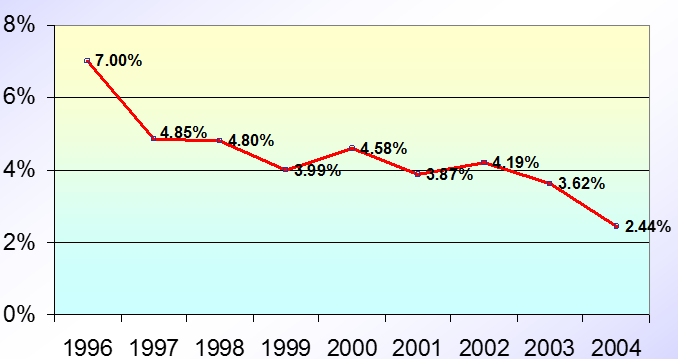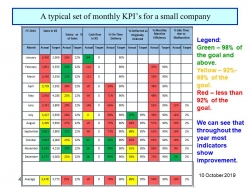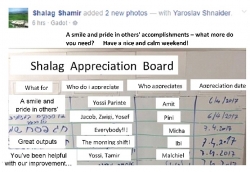Employee absenteeism is common and many companies suffer its effects. The official reason for absenteeism is illness. But is this the real reason? Not always.
Your first, almost instinctive tendency in coping with absenteeism might be to grant a "non-absenteeism bonus". In other words, you pay your employees a bonus for having shown up for work and not staying home to call in sick. But is this the right thing for you to do?
I have addressed this issue for many years as a CEO, and today as well, in the consultation I provide to companies. So, is it right to pay non-absenteeism bonuses? My answer was, and always is, no. There is a better way. But before we consider the alternatives, let's look at the root cause for absenteeism.
Root cause for absenteeism
Absenteeism from work reflects employee motivation and how connected they feel to company objectives.
I believe the two best measures of employee motivation and identification with the company is employee turnover and absenteeism.
Usually, new employees will have a greater tendency to leave because of lack of motivation and identification with the company, whereas veteran employees will prefer not to risk leaving a steady workplace and will choose instead to stay at home and use up their sick days.
A few weeks ago, I published an article on the creation and evaluation of employee motivation, so I won't go into it here. I will only state the numerical data, so you may compare:
Let's define the rate of employee absenteeism as covering all absences that are not preapproved vacations, maternity leave or military reserve duty. Unfortunately, we do get sick from time to time and therefore we will evaluate the rates of absenteeism-due-to-illness at our company in comparison with the accepted rate in Israel (approximately 1-.2.5%).
If it is true that much employee absenteeism is an expression of lack of motivation or identification with company objectives, does granting a non-absenteeism bonus address the root cause?
Are all sickness leaves an expression of lack of motivation?
Absolutely not. It's really important to remember that now and again, we all get sick. And, as managers, we are not doctors and we should never doubt an employee's complaint of stomachache, back pain or any other problem.
Therefore, we should cope with absenteeism through its root causes, meaning employee connection and identification with the company.
Let's look at two examples
- At a large company involved in the heavy metal industry, absenteeism hours decreased by 40% within two years (representing thousands of work hours).At a major company I managed in the past, we began with 7% absenteeism in our first year and succeeded in reducing this to l
- Less than 5%, where we stayed for a number of years. Finally, we decided to use professional tools and reduced absenteeism further to less than 2.5%.
Let's look at the following graph:

What should we do?
Once again, I remind you that the root cause for employee absenteeism is lack of motivation or identification with the company. So, let's use tools that will strengthen bonds and identification with the company and raise motivation.
I recommend taking the following steps:
- Bonding. I used to personally phone every employee who called in sick on their first day of illness and then once a week or ten days after that. I managed a site with 350 employees and sometimes, some of them were sick. So, where could I possibly find the time to call each employee who was sick? Not easy. But think of an employee who is feeling ill and gets a phone call from the CEO or senior manager on the very first day of illness, sincerely asking them how they are. Think how that employee might feel.
If the employee is really sick, they might feel proud that they are important enough for the CEO to call. They might feel pride that their workplace cares about them.
If the employee is not really sick, they might feel discomfort at skipping work while their place of employment is sincerely concerned for their health.
Often the employees would begin with an apology and I would empathize with them. I would make it completely clear that I am only calling to see how they are and to wish them good health. This sincere empathy is one of the strongest tools there is. - Information. Emphasize the damage to the company caused by the absence of this employee, both to managers and, mainly, to other employees. Sometimes we only see ourselves and think something like "so what if I don't come to work for one day, what can happen?"
Presenting the entire picture changes our attitudes towards it. - Payment for sickness days only by law. Many companies will accommodate sick employees and pay in full from their first day of absence. This is a fair solution for employees who have really been sick, but on the other hand, we are also encouraging employees to occasionally call in sick and not come to work. The law states that an employee is not entitled to salary for the first day of illness, and for day 2 and 3, only half of their sick day salary. Only on the fourth day is the employee entitled to full salary.
- Appreciation. Award attention to employees who have not been sick at all for the last six months or the entire year. In the example above, there were only 3 employees (2 of them managers) who came to work every day in the first year. They received full-hearted appreciation and encouragement and in public (with no bonuses). In coming years there was a jump in the number of employees who had not missed one day of work.
Twice a year, we would celebrate with all of the employees who had not missed any workdays, together with their spouses. It was an impressive evening, with dinner and activities. We also continued the tradition of awarding certificates of appreciation to employees.
As you saw above, the results for both examples was impressive.
Work accidents
Work accidents are the reason for a relatively large number of days of absence, but they put employees at risk and it is very important to act in this area as well. This subject requires separate discussion, and I invite you to refer to a number of relevant articles I have written and published in my blog. The most recent of them was about six months ago, addressing proactive safety.
Summary and recommendations
The root cause of most employee absenteeism is lack of motivation or the absence of a connection with the company and its objectives. So, it does not seem right to award non-absenteeism bonuses. Instead, one should develop employee bonds and identification with the company.
A non-absenteeism bonus may attain impressive results in the beginning, but as we are not dealing with the source of the problem, it will not resolve the root problem.












 My First Book: Manage! Best Value Practices for Effective Management
My First Book: Manage! Best Value Practices for Effective Management